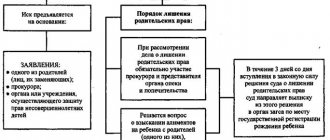Author of the article: Roman Gavrilov Last modified: January 2021 55048
Before you figure out how to deprive a former official spouse or common-law husband of paternity, you need to take into account that, in the legal sense, a man can cease to be a father if the child is adopted by another person. Deprivation of parental rights does not terminate paternity and the obligation to provide for the child: provide him with alimony, and bear the costs of additional actual expenses. Adoption of a child is possible with the consent of the father or without consent, if the man is deprived of parental rights and at least six months have passed after the completion of the procedure.
Expert commentary
Gorchakov Vladimir
Lawyer
In family law, deprivation of the right to raise a child by a parent is considered an exceptional measure. It is possible only in the cases specified in the RF IC - Art. 69. The procedure requires a trial and the mandatory participation of the prosecutor - his written legal position on the case. You will also need a preliminary and final (voiced in court) conclusion of the guardianship authorities, which the second parent or other interested legal representative of the minor has the right to apply to.
General information about deprivation of paternity
The father is vested with rights in relation to the child from the moment his data is entered into the children's documents. The list of parental rights is specified in the Family Code.
Basic rights of the father:
- for communication;
- for education;
- to participate in training;
- property rights (to receive pensions and benefits from the state, inheritance in the event of the death of a child, collection of alimony from an adult able-bodied son).
Expert opinion
Stanislav Evseev
Lawyer. Experience 12 years. Specialization: civil, family, inheritance law.
Deprivation of paternity is used as a last resort for parents of a minor child. If children have reached 18 years of age, no punishment can be applied.
Often, the application of a measure is preceded by a restriction of rights or long-term preventive work with the family by social services.
Only a court can deprive paternity. Before the court decision comes into force, the man has the right to demand the return of the child from any person who is illegally detaining him.
Important! It is impossible to initiate the process of depriving paternity if the man is in prison. The exception is taking into custody in the case of murder or harm to the health of the mother or another relative of the child.
Results. Legal advice
So, deprivation of paternity is a measure aimed at protecting the child from unlawful actions or inaction on the part of the father. Only a court can deprive a person of paternity - on grounds a full list of which is contained in the law.
The procedure for a mother who has decided to deprive her father of parental rights involves, first of all, careful preparation:
- drawing up a legally competent and reasoned claim
- collecting evidence confirming the importance of removing the father from the child’s life,
secondly, responsible, punctual, confident participation in court hearings, the date and time of which she will receive subpoenas.
Expert opinion
Dmitry Nosikov
Lawyer. Specialization: family and housing law.
You may well be able to cope with these tasks on your own - based on the recommendations outlined above, a ready-made sample claim prepared by our lawyers, and a list of necessary documents.
But if you need help or advice, you can ask our lawyer a question and get a free consultation.
We will help you prepare for the trial and protect the rights of the child in court. Attention!
- Due to frequent changes in legislation, information sometimes becomes outdated faster than we can update it on the website.
- All cases are very individual and depend on many factors. Basic information does not guarantee a solution to your specific problems.
That's why FREE expert consultants work for you around the clock!
- via the form (below), or via online chat
- Call the hotline:
- Moscow and the Region
- St. Petersburg and region
- FREE for a lawyer!
By submitting data you agree to the Consent to PD Processing, PD Processing Policy and User Agreement.
Anonymously
Information about you will not be disclosed
Fast
Fill out the form and a lawyer will contact you within 5 minutes
Tell your friends
Rate ( 1 ratings, average: 5.00 out of 5)
Author of the article
Irina Garmash
Family law consultant.
Author's rating
Articles written
612
Reasons for deprivation of paternity
A complete list of grounds for deprivation of paternity is provided by the Family Code:
- Refusal or evasion of financial support (non-payment of alimony for a long time without good reason).
- Cruelty to a minor. Abuse includes physical (beatings, torture, harm to health), psychological or sexual violence. The fact must be confirmed by a verdict of criminal prosecution.
- Abuse of paternal rights. Abuse includes being forced into vagrancy, alcohol or drug use, involvement in criminal activity, or solicitation for prostitution.
- Remaining in a medical or social organization. One option is to abandon the newborn in the maternity hospital. This is equivalent to being left in a social center, a children's department of a hospital, or a children's camp.
- Registered at a drug treatment clinic with a diagnosis of alcoholism or drug addiction. The presence of the disease must be confirmed by a specialist.
- Bringing to justice for committing a crime against the life or health of a child, his mother, mother’s husband or other relatives.
In practice, failure to meet the child's needs is equivalent to abuse. For example, if the father refuses to buy food, seasonal clothing, or bed linen. In this case, the plaintiff does not have a court verdict to hold the citizen accountable.
The presence of culpable actions is proven with the help of a court decision to limit paternity. If the man has not restored his rights within 6 months, then the child’s legal representative must initiate deprivation of rights.
Circumstances
In addition to the reason, there are also circumstances that can force a mother to deprive her ex-husband of parental rights:
- Travel abroad. For example, you want to go live or just relax abroad. The child, of course, goes with you. But the law allows a child to leave only if there is a mutual agreement of the two parents certified by a notary. Very often, negligent ex-husbands use such an unpleasant fact to annoy the mother and child.
- Caring for parents. As the family code tells us: adult children are obliged to care for their parents. And taking advantage of this, many “fathers”, being in old age, remember that somewhere they have a son. The latter will have to pay money to his “father”, if not voluntarily, then through the court.
- New marriage. A more positive situation. A woman gets remarried and her husband wants to adopt an existing child. However, in this case, the written consent of the ex-husband will be required, but far from each of them gives it.
The procedure for depriving paternity without the consent of the father
Let's consider whether paternity can be deprived without the father's consent. The law provides for this possibility. If illegal actions are committed against a minor, the father's consent is not required.
The procedure takes place exclusively in court. The application is considered in the city or district court.
The initiators of the process can be:
- mother of the child;
- legal representative of the minor (guardian, foster parent or director of the orphanage);
- district prosecutor;
- district guardianship department;
- District Juvenile Affairs Commission.
If the application is submitted by other citizens or officials, the court will return the documents without consideration.
Voluntary relinquishment of parental rights (by mutual consent)
If both parents agree to take this step, then the court can carry out the procedure without problems, since this decision is entirely voluntary.
During this procedure, the citizen must understand that he is transferring his rights to the child to another person.
This decision must be formalized only by a notary.
Step-by-step instruction
The procedure is almost identical regardless of the plaintiff. Algorithm of the applicant's actions:
- Preparing for the process.
- Collection of evidence.
- Preparing a claim.
- Going to court.
- Trial.
- Obtaining a court decision.
Preparation for the process
Let's look at where to start depriving paternity. Before going to court, measures must be taken to preserve the blood connection between father and child. Since punishment is applied exclusively in a situation where other measures have failed.
Actions to preserve the family are carried out if the procedure is initiated by social authorities or the prosecutor's office. The mother can submit documents without prior preparation.
However, to satisfy the requirements, it will be necessary to prepare a significant amount of evidence of the feasibility of the decision made.
If a man does not fulfill parental responsibilities for financial support, then he must obtain a certificate of the amount of alimony debt.
Additionally, you can contact the guardianship department at the father’s place of residence to conduct an examination of living conditions. Specialists will visit the living space and draw up a report. The document must reflect the lack of living conditions for the child, the lack of children's things, and the lack of a sleeping place for the child.
Important! The measure applies exclusively to the blood father, whose relationship is officially confirmed.
Collection of evidence
The following documents must be collected as evidence:
- civil passport of the initiator of the process;
- documents confirming the authority of the plaintiff (certificate of a guardian or adoptive parent, power of attorney from an organization for orphans);
- child's birth certificate;
- document on marriage/divorce;
- an extract from the house register about the child’s place of residence;
- characterizing materials about the father (from the place of work, study, from neighbors, from the district police officer).
A mandatory document is the basis for deprivation of rights. Among them:
- a verdict of causing serious harm to health or murder of a mother, child or other relative;
- verdict of child abuse (beatings, torture);
- conviction of sexual abuse of a child;
- resolution on the involvement of minors in drinking alcohol;
- court decision to limit paternity (6 months after the decision is made).
The exact list of documents depends on the specific situation.
Preparing a claim
The statement of claim for deprivation of paternity must contain the following information:
- name of the judicial authority;
- applicant details;
- information about the defendant;
- third parties (guardianship department);
- prosecutor's office;
- title of the statement of claim;
- information about the relationship between the child and the man;
- grounds for deprivation of rights;
- measures taken to preserve the family;
- reference to law;
- claims, including collection of alimony (if the funds were not collected earlier);
- list of documents;
- signature and date.
Sample statement of claim for unilateral deprivation of paternity without the consent of the father
Going to court
Let's consider where the applicant should apply. The documents are sent to the district court at the place of registration of the man. If the exact place of residence is unknown, then the documentation is sent to the last known place of residence.
If the applicant demands to collect alimony, the documents can be sent to the court at the place of registration of the child. To do this, you must attach an extract from the house register.
Documents can be sent to the court:
- personally;
- by mail;
- through a representative.
If the documentation is sent by mail, then you need to include a description of the contents in the envelope. Documents are prepared according to the number of parties to the process (defendant, court, prosecutor's office, guardianship department).
Trial
The applicant must attend the trial in person. During the process, you will need to confirm your claims.
The initiator of the proceedings must be prepared for a personal meeting with the defendant. The judge may ask clarifying questions.
If written evidence is insufficient, the applicant may bring witnesses to court. The following may serve in this capacity:
- child's teachers;
- neighbours;
- relatives;
- Friends;
- representatives of social authorities;
- district police officer
Depending on the specific situation, other citizens may be invited. They must confirm the father's inadequate performance of parental responsibilities and the danger of leaving the child with him.
Obtaining a court decision
If the claim for deprivation of paternity of the ex-husband is satisfied without his participation, it is necessary to obtain a court decision that has entered into force.
In addition, the court issues 2 writs of execution:
- about the removal of a child;
- on the collection of alimony.
If the child is with the man, according to the writ of execution, the bailiffs must seize him and hand him over to the person established by the court decision.
If the initiator of the process was the prosecutor's office or social authorities, then the minor is transferred to the care of the guardianship department. The subsequent relocation of the child is determined by the decision of the municipality.
Completing the application correctly
First of all, the mother of the child, as well as the child’s guardians or trustees, guardianship authorities, and the prosecutor have the right to file an application with the court. The application should indicate:
- name of the court;
- your first name, last name and patronymic;
- place of residence (registration);
- Full name of the defendant, place of residence;
- what is the violation of the rights of the child;
- evidence confirming the parent's inappropriate behavior towards his child;
- a list of documents that you attach to your application.
This application must be confirmed by your signature. Please attach a document confirming payment of the fee to your claim. Also provide evidence that supports the basis for your claim.
Duration of the trial
The duration of the trial depends on the amount of evidence. If the applicant has provided the court with irrefutable information about the improper fulfillment of paternal rights, then the decision will be made in 1 meeting. In such a situation, from filing the application to receiving the court decision, it will take 2 months + 1 month to give the document legal force.
However, the period of proceedings may be extended if:
- the man brings witnesses who prove the absence of guilty actions on his part;
- there is no irrefutable evidence of guilt;
- the plaintiff's witnesses do not appear at the trial;
- the judge goes on vacation;
- the father files an appeal.
In practice, cases of deprivation of paternity rarely last more than 4 months.
If dad was recorded from mother's words
There are cases when the mother writes the second parent in the “father” column on her own. There is a corresponding record about this in the registry office. In this case, problems may arise with deprivation of rights. It will be necessary to prove:
- that there is no legitimate pope as such;
- that the man agrees to have his name removed from the birth certificate if one actually exists.
Important! If a relationship between the child and the registered father is proven, the mother’s application will most likely be refused.
The article described everything related to deprivation of a father’s parental rights. When submitting an application, you must take into account the listed nuances, and also understand that the consideration and trial of such cases is a slow process.
Applicant's expenses
Since the process of depriving paternity is carried out to protect the rights of a minor, the Tax Code does not require the applicant to pay a state fee. Costs are borne by the defendant if the claims are satisfied.
Let's consider what the plaintiff needs to pay. The main cost to the applicant is the cost of a lawyer.
| No. | expenditures | Price |
| 1 | Legal consultation | From 3,000 rub. But you can get it for free on our website. Just leave a request in the feedback form. |
| 2 | Preparation of a statement of claim | From 3,000 rub. |
| 3 | Representation in court | From 5,000 rub. for 1 meeting |
Possible difficulties
The main problem is that the civil process can drag on for more than one month. The thing is that such cases concerning children are considered by judges very carefully.
In addition, the applicant himself needs to not only write an application to the court, but also provide evidence. Representatives of the guardianship authorities and the prosecutor's office are also invited to the meeting.
Obligation to pay alimony
Deprivation of paternity implies the exclusion of parental rights. However, the child retains property rights to material support from the father.
Therefore, the man must pay alimony ordered by the court. If the funds were collected earlier, the obligation to pay remains.
Moreover, in the event of deprivation of rights for evading the payment of alimony, the plaintiff can bring the man to criminal liability. The maximum penalty for refusal to pay alimony is 1 year in prison.
Consequences for father and child
Consequences for the father:
- inability to communicate with the child;
- inability to live together with the child;
- abolition of all payments and benefits for families with children;
- impossibility of spending maternity capital if there is a certificate;
- a ban on issuing a certificate of maternal capital for subsequent children;
- abolition of benefits for large families;
- removal of the status of a large family;
- impossibility of collecting alimony from a child if he reaches the age of majority;
- impossibility of inheriting children's funds in the event of his death.
Consequences for the child:
- maintaining rights to alimony;
- preservation of inheritance rights;
- moving to a shelter, orphanage or to a guardian's family (in the absence of the mother);
- the opportunity to communicate with the father with the consent of the mother.
Consequences for the mother:
- in labor relations it is equivalent to a single mother (in case of dismissal, transfer to another job, layoff);
- has no rights to benefits and payments to a single mother.









